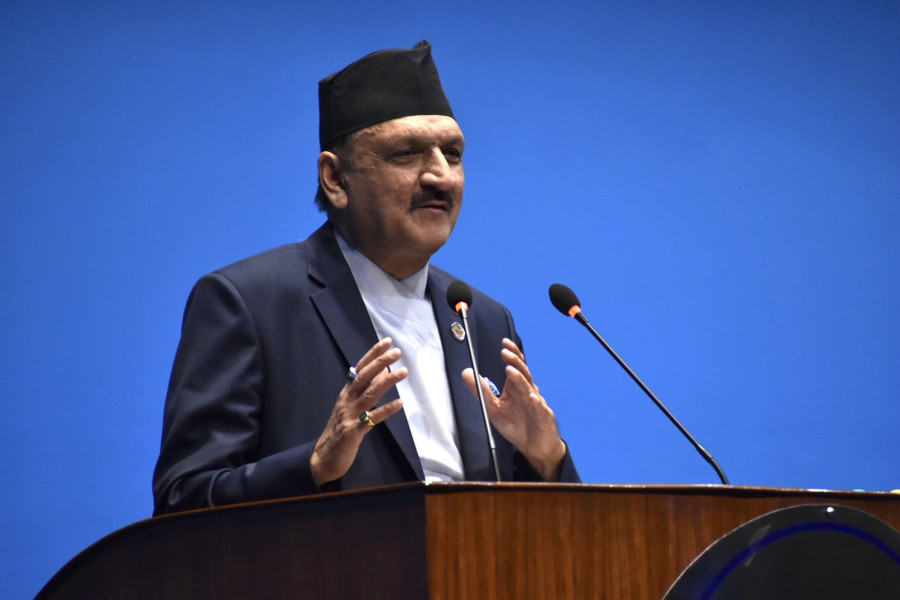Money
FNCCI calls for tax cuts and increased spending
Ad hoc decision making by the government and the central bank is hurting the economy, private sector representatives say.
Subin Adhikari
The Federation of Nepalese Chambers of Commerce and Industry (FNCCI) has asked the government to balance its fiscal and monetary policies to pull the country out of the current recession.
Nepal’s top private sector association on Wednesday urged the government to cut tax rates and increase spending to stimulate the economy as spending on infrastructure projects would create jobs and boost incomes.
According to economists, a country’s monetary and fiscal policies are the two main tools used to maintain a stable and balanced economy. The monetary policy addresses money supply to promote economic activity while the fiscal policy deals with taxation and government spending.
Presenting a wish list to Finance Minister Prakash Sharan Mahat for the upcoming budget, the FNCCI said the government should reduce administrative expenses and allocate more funds for infrastructure development.
“The fiscal and monetary policies do not work in tandem. Not at all. The political parties are shying away from their responsibility to address the problems in the economy,” said Chandra Dhakal, president of the FNCCI. “This will only make the crisis more severe.”
The private sector representatives also requested the government to review the value-added tax (VAT) system. VAT was fixed at 10 percent when it was launched in 1997. The rate was jacked up to 13 percent in 2005 amid pressure to generate revenue during the Maoist conflict.
“This system needs to be reviewed to suit the present context,” said Ambika Prasad Poudel, president of the tax and revenue division of the FNCCI.
The private sector representatives pointed out that ad hoc decision making by the government and the central bank was hurting the economy.
“Nepal Rastra Bank halted domestic remittance without preparation. Workers in the cities are barred from sending money to their homes, particularly in remote areas,” said Dhakal.
The entrepreneurs also requested the government to enlist construction, agriculture, tourism and manufacturing as priority sectors in the upcoming budget.
The private sector has requested the government to focus on reviving the construction sector, the worst performer this fiscal year. The growth rate of the construction sector, which contributes 5.52 percent to the GDP, has dropped. In the last fiscal year, the construction industry expanded by 7 percent.
Mining activities too have been hit by the current recession. Illegal crusher factories were temporarily shut down in January 2023 which led to a shortage of construction materials such as sand and aggregates. This slowed down development projects.
“Extending the completion deadline of the projects isn’t enough to revive the construction sector,” said Dhakal.
The private sector requested the government to assist them to make proper and optimum use of the mining and crusher industries. According to a survey conducted by the FNCCI, the country can earn around $2 billion annually by exporting sand and stone from its rivers.
“The government should settle the payment issue of the contractors and shut down projects that are taking too long,” said Dhakal. “The economy can’t recover unless the construction sector recovers.”
Nepal has been encountering a series of challenges starting from the earthquake and trade embargo to the Covid pandemic and the recession.
The country achieved an economic growth rate of 7 percent for two consecutive years even after the earthquakes of 2015. Following the Covid-19 pandemic, the economy rebounded with growth rates reaching over 4 percent for two consecutive years.
The private sector, which accounts for around 81 percent of the GDP, said tackling the recession amid political uncertainty would be challenging.
Minister Mahat admitted that the private sector was the driver of the country’s economy. “The government has its own limitations. Revenue is declining and interest on foreign debt is mounting,” said Mahat.
“Some positive changes like lowering the interest rate have already commenced. The upcoming budget will take the necessary corrective measures to address the ongoing economic woes.’’
Mahat urged the private sector to come on board to address the challenges the country’s economy is facing. “We don’t have a readymade solution to every problem. The problem should be tackled mutually,” he said.
Anjan Shrestha, senior vice-president of the FNCCI, said, “The ongoing economic crisis is affecting everybody. From the lower class to the middle class, all are suffering. The government must intervene immediately to prevent further damage.”
The FNCCI suggested eliminating loopholes in the existing taxation system which, it said, was promoting smuggling, particularly through the porous border with India.
The association said businesses should be given a time extension to pay taxes owing for more than five years by charging nominal fines.
It has also urged the government to adopt a liberal policy allowing unaccounted property to be registered by paying certain taxes.
For the benefit of micro enterprises, the FNCCI said the provision of auditing the accounts of firms with an annual turnover of less than Rs10 million should be removed and they should be charged a flat tax.
FNCCI president Dhakal said the government must provide the same facilities and concessions to domestic manufacturing industries which are currently given to exporters.
“The existing credit-deposit ratio, bank rate and risk rate maintained by the central bank are preventing the flow of liquidity in the market. Therefore, they must also be made flexible,” said Poudel.
“The government has promised various online services like land registration, company registration and tax payment, but this has not happened,” added Poudel.
Representatives from various organisations stated that red tapism was making it difficult for small enterprises to operate, therefore, the paperwork burden must be slashed.




 10.12°C Kathmandu
10.12°C Kathmandu














